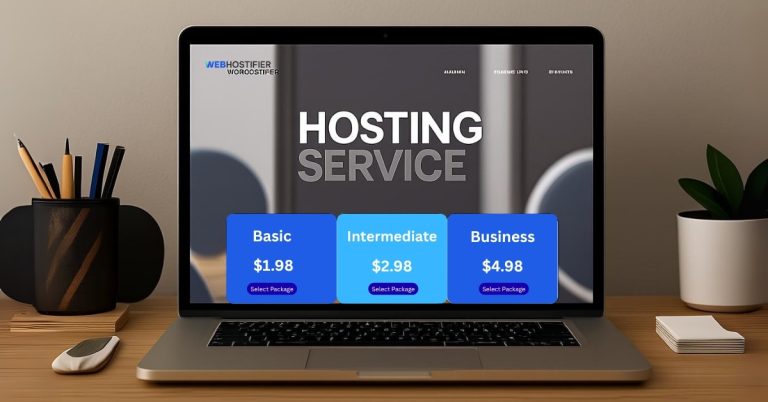Web Hosting vs Website Builders: Key Differences Explained
Web Hosting vs Website Builders: What’s the Difference?
When you’re looking to create a website, the first big decision you’ll face is choosing between web hosting and website builders. But here’s the catch: what’s the real difference between the two, and which one should you pick? Well, in this article, we’re going to break it down for you, explain the pros and cons of each, and help you make an informed decision.
Let’s dive in.
What Is Web Hosting?
At its core, web hosting is the service that allows you to store your website’s files on a server so that people can access it via the internet. It’s the “home” where your website lives. Without web hosting, your website would be a collection of files on your computer.

How Web Hosting Works
When you sign up for web hosting, you’re essentially renting space on a server where your website’s files will live. When someone types in your domain name, their browser sends a request to the hosting server, which then sends your website files back to the user’s browser so they can view your content.
There are various types of hosting.
- Shared Hosting: Multiple websites share the same server resources. It’s cheap, but performance can suffer during high traffic.
- VPS (Virtual Private Server): A step up from shared hosting, offering dedicated resources for your site. It’s more expensive but more reliable.
- Dedicated Hosting: You get an entire server dedicated to your website. This is ideal for large, high-traffic websites.
- Cloud Hosting: Scalable hosting where resources are spread across multiple servers. It’s cost-effective and flexible.
What Are Website Builders?
On the other hand, a website builder is a tool that allows you to build a website without any coding. These platforms offer an easy-to-use interface where you can drag and drop elements, choose templates, and publish your site. Think of it as a DIY kit for your website. Some of the most popular website builders include Wix, Squarespace, and Weebly.

How Website Builders Work
Website builders host your site for you, so you don’t need to worry about the technical side of things like managing servers or software. Everything from domain registration to site creation and hosting is handled within the platform itself. You don’t need to know how to code, and you can have a site up and running in hours instead of days.
Most website builders offer
- Pre-designed templates for easy customization.
- Drag-and-drop features for easy design.
- Built-in hosting and domain registration.
- Integrated tools for SEO, marketing, and social media.
Web Hosting vs Website Builders: The Key Differences

1. Customization and Control
With web hosting, you have full control over your website’s design, functionality, and server settings. This is crucial if you want to add custom features or create a highly optimized, unique site.
- Website builders, on the other hand, offer more limited customization. They’re designed to be easy for beginners, but you’re confined to the templates and tools provided.
2. Technical Knowledge Required
To use web hosting, you’ll need a basic understanding of how to manage your website and server. It’s not rocket science, but it’s more technical than using a website builder.
- Website builders are user-friendly and designed for non-technical users. You won’t need to learn coding or server management.
3. Cost
In general, web hosting tends to be cheaper, especially if you’re starting with shared hosting. You can always scale up as your site grows.
- Website builders usually have a higher recurring cost since they bundle everything (hosting, templates, support) into one package.
4. Flexibility and Scalability
Web hosting provides a lot more flexibility, allowing you to install any software, manage databases, and tweak your website as much as you want. You can also scale your website as your business grows.
- Website builders can be limiting if you want to scale. For example, if you start getting more traffic and need advanced tools, you might find it harder to migrate away from a website builder to a custom hosting solution.
5. Speed and Performance
Web hosting performance depends on the server you choose. Dedicated hosting or cloud hosting offers better performance than shared hosting.
- Website builders usually offer decent performance, but they can suffer from slower load times due to their all-in-one nature, especially during high traffic.
Benefits of Web Hosting
- Full control over your site: You can customize everything from the design to the backend code.
- Better performance options: With the right hosting plan, your site can load faster and handle more traffic.
- Scalability: As your website grows, you can upgrade to higher-performance servers or add more features.
- Unlimited features: Install plugins, apps, and more for advanced functionality.
Benefits of Website Builders

- Ease of use: They’re incredibly beginner-friendly, even for people with no coding experience.
- All-in-one solution: Hosting, domain registration, and design tools are all bundled together.
- Speed: You can have a website live in a matter of hours without needing to configure anything.
- Support: Most website builders offer customer support to guide you through any issues.
Limitations of Web Hosting
- Requires technical know-how: You’ll need to know how to manage your hosting account, databases, and security.
- Higher learning curve: Customizing your site and managing your server might take some time to get used to.
Limitations of Website Builders
- Limited customization: You’re often restricted to the templates and features the builder provides.
- Slower performance: Website builders may not offer the same performance as a dedicated hosting solution.
- Higher long-term costs: Over time, the subscription fees for website builders can become more expensive than paying for traditional hosting.
Practical Applications: When to Use Web Hosting vs. Website Builders
Use Web Hosting if
- You want full control over your website’s design and functionality.
- You have or plan to have technical expertise or a developer to manage the website.
- You’re running a high-traffic site that needs to scale.
- You need to use specific software or have custom functionality.
Use a Website Builder if
- You’re a beginner who needs to create a website quickly and easily.
- You need a simple, personal, or small business site.
- You’re on a tight budget and don’t want to manage hosting separately.
- You’re looking for an all-in-one solution for hosting, design, and support.
Web Hosting vs Website Builders: Common Myths
1. Website Builders Are Only for Beginners
This is false. While website builders are beginner-friendly, many pro designers and developers use them for small to medium projects due to their speed and simplicity.
2. Web Hosting Is Too Complicated for the Average User
Not true. While it may require some learning, web hosting can be straightforward with the right tools and support. Platforms like WordPress make it easy to set up and manage your website with a hosting provider.
Tips for Choosing Between Web Hosting and Website Builders
- Start with your needs: If you’re building a personal blog or portfolio, a website builder might be enough. For an e-commerce business, you might need the flexibility and performance of web hosting.
- Budget: If you’re on a tight budget and want a simple site, website builders are cheaper upfront. However, in the long term, web hosting can provide better value for growing businesses.
- Future growth: If you plan to scale your site or need custom features in the future, web hosting gives you the flexibility to grow as your business evolves.
Conclusion
In the battle of web hosting vs website builders, there’s no one-size-fits-all answer. Your choice depends on your specific needs, skills, and goals. If you want full control, scalability, and flexibility, web hosting is the way to go. But if you need a simple, easy-to-use platform to get started quickly, a website builder will do the job.
The key takeaway? Know what you want and where you want to go and choose the option that sets you up for success.
Q&A
1. Can I use a website builder with my web hosting?
Yes, many website builders allow you to host your site on your server. However, some website builders offer bundled hosting as part of their service.
2. What’s the easiest way to get started with web hosting?
Choose a beginner-friendly hosting provider like Bluehost or SiteGround, and use WordPress as your website platform. These services handle the heavy lifting for you.
3. Can I migrate my website from a website builder to web hosting later?
Yes, but it can be a bit tricky, depending on the builder you’re using. You’ll need to export your content and redesign it using your new hosting platform.







